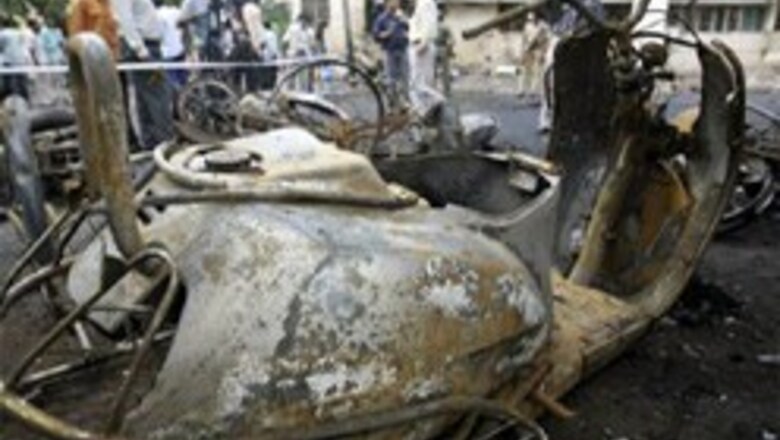
views
New Delhi: The sophistication of a wave of bomb attacks has caught the country's police and intelligence networks napping, and suggests terrorists may have received training abroad.
At least 46 people were killed in a succession of bomb blasts since Friday, most of them in the communally sensitive city of Ahmedabad. "There was a high level of sophistication in the way these attacks were planned and orchestrated," said B. Raman, a former head of India's external spy agency, the Research and Analysis Wing (RAW).
"The people who did it have a lot of expertise." Reports suggest the Internet account of an American living in Mumbai was hacked into to, to send an e-mail just five minutes before the first bombs exploded in Ahmedabad, warning of death "in the name of Allah" and on behalf of a group called the Indian Mujahideen.
An earlier e-mail sent by the group before May's attacks in Jaipur had been traced to a cybercafe, a method also used to track down Daniel Pearl's kidnappers in Pakistan in 2002.
This time the sender of the e-mail may prove harder to trace. Integrated circuits were used to detonate the Bangalore bombs, technology which requires expertise and training.
The bombers also stayed one step ahead of the police by not using mobile phones to detonate Saturday's blasts, as they had in the past.
That allowed the bombers to detonate a second set of bombs without having to worry about the mobile phone network being closed down, as police in Bangalore did on Friday.
The Indian Mujahideen says "each and every Mujahid belongs to this very soil of India". But Ajai Sahni of the Institute for Conflict Management sees the hand of Pakistan's spy agency, Inter Services Intelligence (ISI), a charge Islamabad denies.
"The ISI role in supporting these groups, and in facilitating and resourcing these groups is unquestionable, as is a great deal of communications chatter between cadres and operatives in India and ISI handlers in Pakistan," he said.
On Monday, Afghan intelligence also accused the ISI of training thousands of militants to attack Indian road projects in Afghanistan, and blames it for the suicide bomb attack on the Indian Embassy in Kabul this month that killed 58 people.
That talk has left the peace process between India and Pakistan "under stress", the Indian government said this month.
Indianisation Of The Jihad
There have been at least a dozen major bomb attacks in India since the start of 2006, killing hundreds of people. Yet to carry two separate attacks on consecutive days in cities 1,200 km apart, detonating at least 24 bombs, required both intricate planning and scores of local cadres.
For Raman, this marks the success of Pakistan's efforts to "Indianise the jihad", with militant groups manned increasingly, if not totally, by Indian Muslim recruits. Yet the blame cannot only be laid at Pakistan's door.
The Gujarat riots, in which around 2,500 people, most of them Muslims, were killed by Hindu mobs -- and the failure of the government to bring the culprits to justice -- may have been a powerful recruiting tool.
"India must admit after the three last attacks that local boys are involved, that there is an indigenous movement," agreed another former head of RAW, who prefers not to be quoted by name.
What is also striking is India's failure to penetrate these groups, to get the kind of human intelligence so vital in a counter-terrorism effort, what newspapers and commentators have branded "a colossal intelligence failure".




















Comments
0 comment